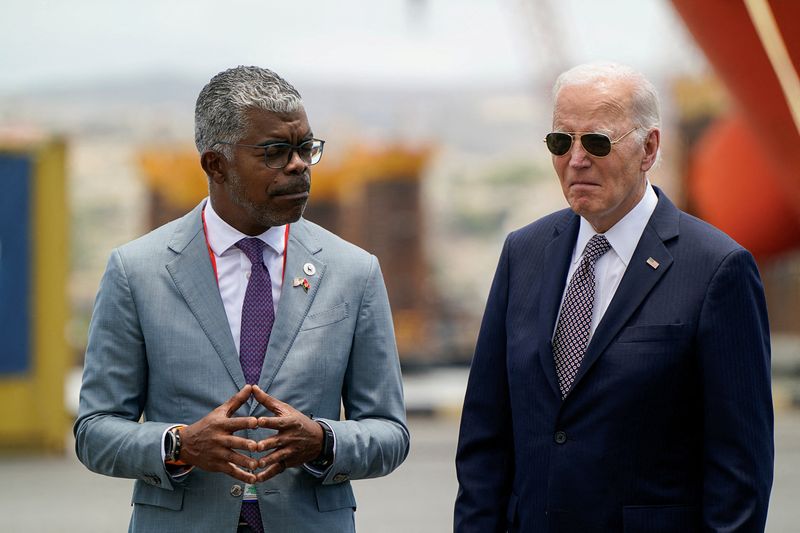By Trevor Hunnicutt and Jessica Donati
LOBITO, Angola (Reuters) -U.S. President Joe Biden met African leaders in the Angolan port of Lobito on Wednesday to advance a plan to extend a railway that could channel critical minerals from Congo and Zambia to the West via Lobito, and counter Chinese clout in the region.
As things stand, China is the main foreign player in Democratic Republic of Congo's mining sector, which exports minerals considered critical for batteries and other industrial components key to transitioning away from fossil fuels.
The United States has provided a $550 million loan to support the Lobito venture, which involves refurbishing an existing railway through Angola and extending it into Congo's mining heartland as part of the first phase.
No date has been given for its completion yet, while a second phase that would link Lobito to Zambia via a new railway line is still at the preparation stage, with an aim to break ground in 2026 according to Washington.
The presidents of Angola, Congo and Zambia and the vice president of Tanzania joined Biden for a summit in Lobito on the last day of his first and only trip to Africa as president.
Biden and Congo's Felix Tshisekedi affirmed their commitment to promoting investment and peace to allow the central African nation to make the most of its vast mineral wealth, according to a note from the White House issued after the two met.
Biden and Zambian counterpart Hakainde Hichilema also met to discuss the Zambian component of the Lobito project and other issues.
"This corridor is of vital importance to opening up our countries, to opening up our regions, the continent, and truly the global economy," Hichilema said. "This project is a huge opportunity for investment, for trade."
"The presidents underscored their conviction," a White House statement said, "that countries should not be held back from investing in their development by the need to service unsustainably high debt, and together committed to continue advocating for reform."
In June, Zambia's international bondholders voted through their part of a $13.4 billion debt restructuring deal, making Zambia the first to complete a full-blown rework under the G20-led "Common Framework" architecture.
THE CHINA FACTOR
The Lobito Atlantic Railway concession, awarded in 2022 to a consortium of Western companies, has been presented as a win against China, as Washington is increasingly concerned about the Chinese grip on critical minerals, including Congo's vast reserves of copper and cobalt.
The second phase of the project envisions extending the Lobito corridor railway through Zambia and connecting it to Tanzania's Indian Ocean port of Dar es Salaam.
The U.S. has funded feasibility studies for the second phase, but critics say it could offer China a rival route eastwards, undermining the entire project from Washington's perspective.
After Donald Trump is sworn in as U.S. president in January, Washington is expected to take a harsher line with China and some officials have questioned whether U.S. support for the eastern route will continue.
Trump will likely back at least parts of the Lobito project and remain a close partner to Angola when he returns to the White House, according to two officials who served under the previous 2017-21 Trump administration.
The details relating to the funding and construction of the second phase of the project are still in question.
The Lobito project is backed by global commodities trader Trafigura, Portuguese construction group Mota-Engil and railway operator Vecturis. There is no date yet for its completion.
A senior U.S. official said on Tuesday that the Lobito project could be completed by the end of the decade, without providing further details.
The U.S. Development Finance Corporation has provided the $550 million loan to refurbish the 1,300-km (800-mile) rail network from Lobito to Congo.
U.S. officials announced fresh financing for the first phase of the venture this week through the Development Finance Corporation worth $600 million for projects including solar, minerals and telecommunications.
Biden pledged lasting U.S. engagement with Africa on the continent's own terms as he met with his Angolan counterpart Joao Lourenco in Luanda on Tuesday. Biden's trip delivered on a promise to visit Africa, but came only weeks before his presidency ends.

Despite his repeated pledges to be "all in on Africa", U.S. influence in Africa has declined during his term in office. Washington has lost a military base in the Sahel region and made little progress breaking China's commercial domination in minerals seen as critical to national security.
Angola has long nurtured close ties with China and Russia but has recently moved closer to the West. It aims to expand its collaboration with the United States on security and military initiatives, Lourenco said during Biden's visit on Tuesday.